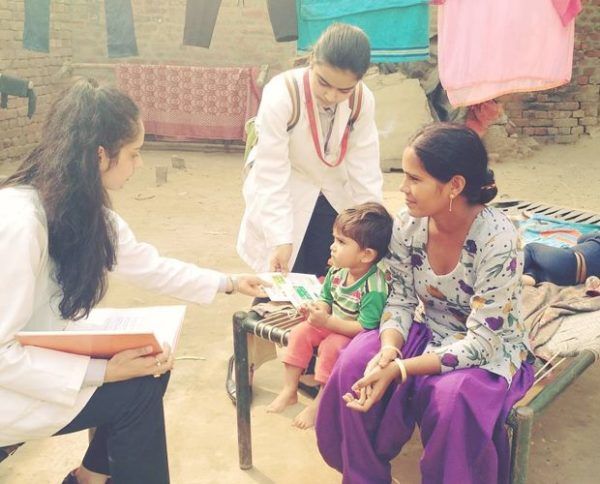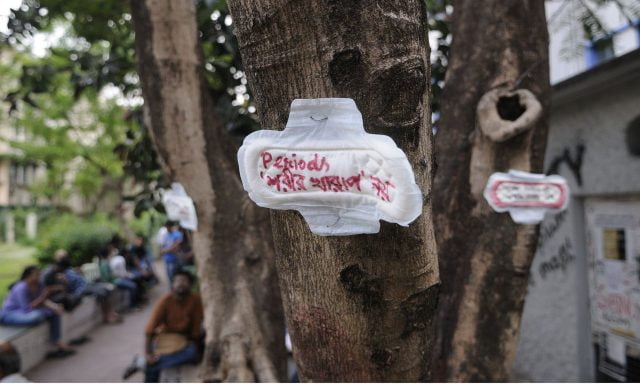Is there a doctor in the house?
In 1966, Reita Faria, a final year medical student, won the title of Miss World for India for the first time and now, after 51 years, the streak repeats as yet another medical student brings home the coveted blue crown.
20-year-old Manushi Chhillar, India’s comeback in the Miss World pageant after Priyanka Chopra’s victory in 2000, was pursuing her first year of MBBS in BPS Medical College, Haryana when she won the Femina Miss India 2017 title and took a year off to prepare herself for the Miss World 2017 pageant.

Growing up in a state with a dangerously low sex ratio, Chhillar was able to witness the hardships faced by women due to poor menstrual management in the country. Her dream to bring about a change in this situation materialized into reality with the Miss World 2017 ‘Beauty with a Purpose’ programme.
Project Shakti
Project Shakti, a campaign initiated by Manushi to spread awareness about menstrual hygiene to young girls and women, had taken wings even before her beauty pageant endeavours. The campaign’s association with the registered charity programme ‘Beauty with a Purpose’ helped to extend its outreach.

The poverty rate of many of the villages are so extreme that they have to choose between food or the luxury of sanitary pads, making it an obvious, yet unsafe decision. In conversation with a reporter from Times of India, she said –
“It was a bit scary to know that girls and women in rural areas are using not just clothes but also hay during their menstruation which is causing a lot of infections to them. Hardly anyone was using sanitary pads when I talked to the people of a village in UP” [1]
How Bad is the Situation?
According to Dasra, a leading strategic philanthropy foundation in India, many women in rural India use socks or rags filled with sand, ashes, and straw instead of sanitary pads. This makes them extremely susceptible to reproductive tract infections and their various adverse consequences.
Cloth could be used if it is cleaned and dried properly in the sunlight but cultural taboos associated with menstruation cause women to dry their menstrual cloth in dingy areas, unexposed to the open air and sunlight, thus keeping them far away from human eyes, even of those within the family. This makes them highly prone to infections.

Around 23% of girls drop out of school when they start menstruating. In some places, as many as 66% of girls skip school during this time and one-third of them eventually drop out [2]. The lack of access to clean water and hygienic toilet facilities in schools were not taken into consideration in the survey but are also defining factors for the plight of many young girls.
Reports claim that approximately 70% of all reproductive diseases in India are caused by poor menstrual hygiene and it can also affect maternal mortality [3]. Lack of awareness forces women to continue in this vicious cycle and put their health, education, and dignity at risk.
Read More – Angelina Jolie Produces The Breadwinner: Movie About Taliban, War-Stricken Afghanistan And A Girl
On the Bright-Red Side…
Thanks to Arunachalam Muruganantham, India’s “Menstruation Man”, and his revolutionary machine that can make cheap sanitary napkins, pads are now an affordable reality to many women across the country. The machine is currently used in 1300 villages, spanning across 23 states. Our very own Ms. Chhillar’s ‘Project Shakti’ has had a positive impact in spreading awareness in around 20 villages and among more than 5000 women in India. She has also engaged in dialogues with the Chief Minister of Haryana, Mr. Manohar Lal Khattar, on the intensity of the issue at hand.
As our Miss World 2017 steps up to take the responsibilities that come along with the title, we can be optimistic that she’ll continue to fulfill her duties to the global society and do India proud.
Image Credits – Google Images
References – [1] – Times of India
[2] – Forbes Marshall survey
[3] – BBC
You May Also Like To Read –
http://edtimes.in/2017/11/why-wanderlust-isnt-for-everyone-and-we-should-accept-it/































